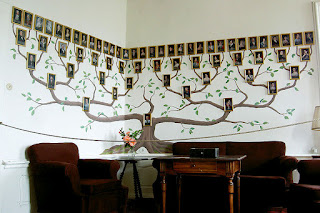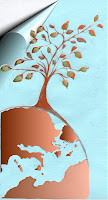Shortly after
I got married – eons ago – I became obsessed with researching my family
history. That was back in the days before
home computers. To get records, I had to
request microfiche film from our local Mormon church, send letters overseas
with return postage hoping for a response, and visit libraries, city halls and
government records departments, and graveyards in person.
I got married – eons ago – I became obsessed with researching my family
history. That was back in the days before
home computers. To get records, I had to
request microfiche film from our local Mormon church, send letters overseas
with return postage hoping for a response, and visit libraries, city halls and
government records departments, and graveyards in person.
 Genealogy research
Genealogy researchhas evolved since then. Today with websites like Ancestry.com, anyone can find
a wealth of information and even connect with distant family members doing
their own research. In fact, I was recently contacted by a third cousin once
removed that I’d never known, and who currently lives in England. It turns out
that his great-grandfather and my grandfather were brothers. It is so
incredibly awesome to be able to make connections like that.
To feed my
love of genealogy and of history, I’ve discovered two shows with similar themes
on two different channels: Who Do You
Think You Are? (NBC) and Finding Your Roots
(PBS)
love of genealogy and of history, I’ve discovered two shows with similar themes
on two different channels: Who Do You
Think You Are? (NBC) and Finding Your Roots
(PBS)
Finding Your
Roots (PBS)
Roots (PBS)
Finding YourRoots is the brainchild of host/producer Henry Louis Gates, Jr., a professor at
Harvard University. It began airing just
this year, but is sort of a spin-off of his 2010 PBS series Faces of America,
which also focused on genealogy. Gates’ programs are especially good at
bringing history alive and making it personal through the stories of the celebs’
various ancestors.
Harvard University. It began airing just
this year, but is sort of a spin-off of his 2010 PBS series Faces of America,
which also focused on genealogy. Gates’ programs are especially good at
bringing history alive and making it personal through the stories of the celebs’
various ancestors.
In each episode Gates focuses on three unique individuals – sometimes,
but not always “celebs”—who have some ancestral characteristic in common, such
as slavery or religion. Gates and his production company do all the research,
and then he has a sit-down with each of the individuals, presenting them with
their own personal “life book” and talking them through their ancestry and
family history. Gates designs each episode to focus on an important historical
aspect of our culture as a nation.
but not always “celebs”—who have some ancestral characteristic in common, such
as slavery or religion. Gates and his production company do all the research,
and then he has a sit-down with each of the individuals, presenting them with
their own personal “life book” and talking them through their ancestry and
family history. Gates designs each episode to focus on an important historical
aspect of our culture as a nation.
One episode
bounced between married couple Kyra Sedgwick and Kevin Bacon, riffing on the
six degree of separation theme that is associated in pop culture with
Bacon. And sure enough, it turns out
there is a relationship connection between the two (something like seventh
cousins).
bounced between married couple Kyra Sedgwick and Kevin Bacon, riffing on the
six degree of separation theme that is associated in pop culture with
Bacon. And sure enough, it turns out
there is a relationship connection between the two (something like seventh
cousins).
Some of the other
people Gates has featured include Samuel L. Jackson, Condolezza Rice, Robert
Downey, Jr., Sanjay Gupta, Wanda Sykes, and John Legend among many others.
people Gates has featured include Samuel L. Jackson, Condolezza Rice, Robert
Downey, Jr., Sanjay Gupta, Wanda Sykes, and John Legend among many others.
Gates also
goes beyond simply building a family tree for each of his guests. He uses DNA
testing to trace the genetic roots back into ancient Europe, Asian and Africa. It’s often a surprise for an individual to
find out what ethnic groups their family lines are or are not derived from.
goes beyond simply building a family tree for each of his guests. He uses DNA
testing to trace the genetic roots back into ancient Europe, Asian and Africa. It’s often a surprise for an individual to
find out what ethnic groups their family lines are or are not derived from.
Who Do You
Think You Are? (NBC)
Think You Are? (NBC)
Who Do You Think You Are? is in its 3rd season on NBC, having started in
2010. It is sponsored by Ancestry.com,
which uses obvious product placement for its services within every
program.
2010. It is sponsored by Ancestry.com,
which uses obvious product placement for its services within every
program.
The approach
for the NBC program is a bit different from PBS one, in that each episode focuses on one celebrity who narrates his or
her own journey and who reflects on the implications of what they discover
about their own personal ancestry. While it’s obvious that all the research has
been done prior to the celebs arrival at each location, it is fun feeling like
you are traveling with them to various locations in the U.S. and even
overseas.
for the NBC program is a bit different from PBS one, in that each episode focuses on one celebrity who narrates his or
her own journey and who reflects on the implications of what they discover
about their own personal ancestry. While it’s obvious that all the research has
been done prior to the celebs arrival at each location, it is fun feeling like
you are traveling with them to various locations in the U.S. and even
overseas.
I was
especially moved by the episode featuring Rashida Jones, actress on the comedy
Parks and Recreation and daughter of Quincy Jones and Peggy Lipton. Jones
traced her Jewish ancestry back to Latvia where she discovered that members of her
extended family had been brutally murdered during the Holocaust.
especially moved by the episode featuring Rashida Jones, actress on the comedy
Parks and Recreation and daughter of Quincy Jones and Peggy Lipton. Jones
traced her Jewish ancestry back to Latvia where she discovered that members of her
extended family had been brutally murdered during the Holocaust.
SNL’s Jason
Sudeikis, Rob Lowe, Edie Falco, Rita Wilson, Reba McEntire, Martin Sheen, and Chef
Paula Deen are among the celebs featured this season.
Sudeikis, Rob Lowe, Edie Falco, Rita Wilson, Reba McEntire, Martin Sheen, and Chef
Paula Deen are among the celebs featured this season.
 It’s
It’simportant that people connect with their family histories. While history textbooks tend to deal
in generalities, when we learn the personal stories of our ancestors, we change our perceptions of what a complex history we have as a nation and what a complex
culture we live in.
These two
genealogy programs that I love may not be everyone’s cup of tea. But how many
of us face the passing of grandparents or even parents realizing that we never
asked them about their family stories?
genealogy programs that I love may not be everyone’s cup of tea. But how many
of us face the passing of grandparents or even parents realizing that we never
asked them about their family stories?
We can start by
asking questions about where our parents, our grand-parents and our great-grandparents
came from. Be inquisitive. Pull out the old photos and start a family discussion.
Ask the older family members to tell their stories and the stories they heard
when they were young. You might be surprised at how delighted they are to share
those stories with you.
asking questions about where our parents, our grand-parents and our great-grandparents
came from. Be inquisitive. Pull out the old photos and start a family discussion.
Ask the older family members to tell their stories and the stories they heard
when they were young. You might be surprised at how delighted they are to share
those stories with you.
And it is
those stories, those experiences by people we may never have known, that played
a role in shaping our own lives today.
those stories, those experiences by people we may never have known, that played
a role in shaping our own lives today.

